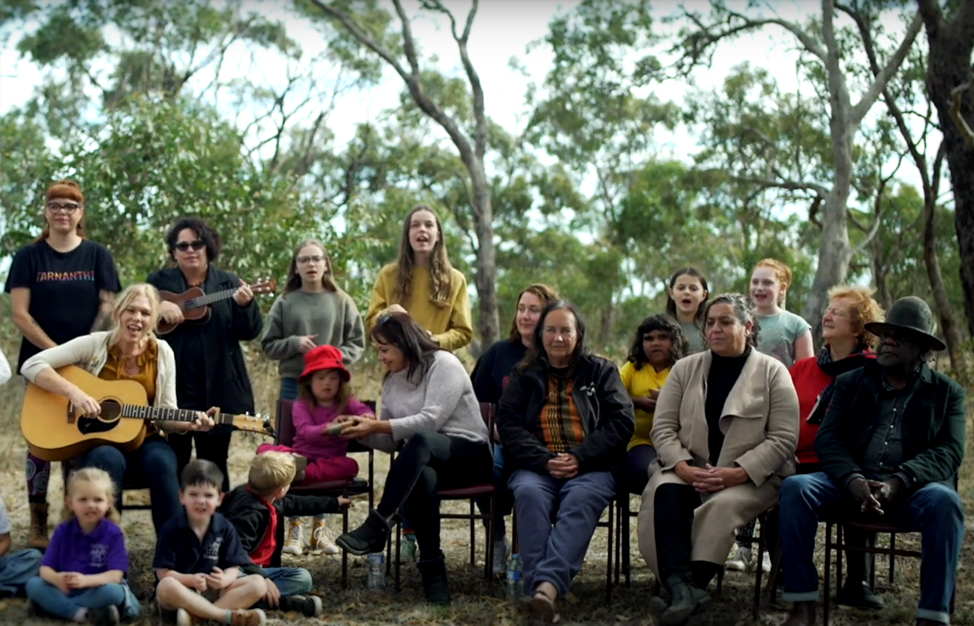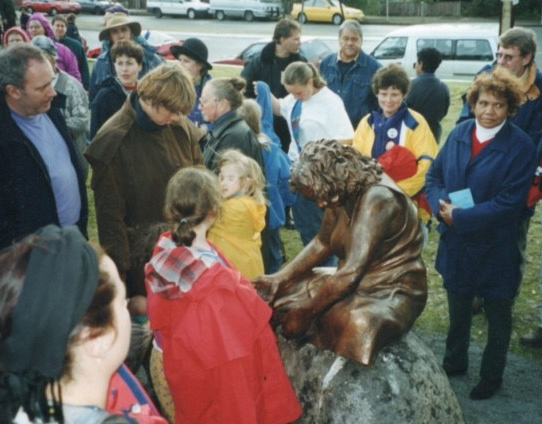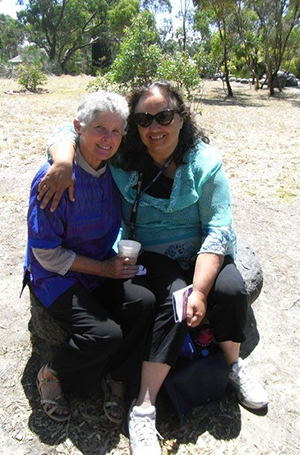31 January 2023
Once home to children of the Stolen Generation, today Colebrook is “a place of healing and learning”, the story of which is told in a film which was shown at the 2022 Cannes Short Film Festival. The film is an initiative of the Blackwood Reconciliation Group which began as a study group in the 1990s and today works with past residents of Colebrook Home to inform the next generation.

Diane Dent
Founder Blackwood Reconciliation Group
Graduate Certificate Aboriginal Studies
It was while nursing at the Royal Adelaide Hospital that UniSA alumna Diane Dent came to realise that her knowledge and experience of First Nations people was quite limited, so she set out to do something about it. Enrolling in Aboriginal Studies at the newly created University of South Australia in 1992, Diane would finish night shift at 7.30am, drive to the Underdale Campus, take a short nap in her campervan and be ready for class at 9am.
While there was opportunity to study remotely, Diane benefitted greatly from hearing from the speakers who were frequently invited to address the students. Her network of Aboriginal peers and friends grew and would later become a handy resource.
“About this time, the Australian government were supporting study circles with extensive information on Aboriginality designed for groups to absorb and share the information, including a recommendation to create a reconciliation group,” says Diane.
A study circle of around eight people was formed and met in the Blackwood Library over many weeks. On completion of the eight-week program the group continued to meet in their various homes and so the Blackwood Reconciliation Group (BRG) was born. Written into the Constitution is their aim “to promote a united Australia which respects this land of ours, values the Aboriginal and Torres Strait Islander Heritage, and provides justice and equity for all”.
Diane reached out to Aboriginal people she had met during her UniSA studies, inviting them to speak to the BRG. “This definitely gave the BRG some authenticity,” says Diane. “As well, it showed me that many non-Aboriginal people wanted very much to have contact with First Nations people. They did not know how they could do this and the BRG eventually became a possible way to meet.”
Once Jean and Mike Brown (who appears in the film) joined BRG the group was connected with a broader network of highly motivated people through the couple’s membership of the world-wide movement Initiatives of Change. In 1996 BRG held a fundraising event open to all which led to an unanticipated meeting with some of the 350 Tji Tji Tjuta (many little children) who had been residents of Colebrook Home. Those who had lived at Colebrook Home came from diverse Aboriginal cultures across South Australia including the Riverland, lakes and desert county, having been removed from their homes and families in accordance with the then policy of assimilation. Some never saw their parents again.
The Home closed in 1972, was demolished the following year, and Colebrook Reconciliation Park now stands as a memorial to those children and their families.

Grieving Mother
Today, nearly 30 years since its inception, the Blackwood Reconciliation Group continues to work alongside the Tji Tji Tjuta, the Aboriginal Lands Trust, local council and other groups and agencies to enhance experiences in the park. Artworks and listening posts help tell the story and promote discussions with visiting students. Sculptures by renowned artist Silvio Apponyi were modelled on various women who grew up in the Home and help ensure their story is told. Grieving Mother is one and another, Fountain of Tears, shows the faces of family left behind when the children were taken.

author and artist, and member of the Stolen Generation
Diane acted as Chair of BRG for many years as the fund raising, events and awareness campaigns continued. She retired from nursing briefly at the age of 60 and again, finally, aged 70. While she’s no longer at the helm, Colebrook Reconciliation Park continues to evolve, and recent additions include a map of Indigenous language groups and a large number of Indigenous plants identified by their botanical and Kaurna names.
Today, Diane lives in Rome – having reconnected with a long lost love – but continues to follow developments at Colebrook Reconciliation Park with interest. “The Blackwood Reconciliation Group has survived the years very well,” she says, “and now I observe it is quite a force.”
Telling truths
With the support of many individuals and organisations, Colebrook Reconciliation Park has become an important and significant destination, popular with many schools in the areas surrounding Eden Hills and beyond. In 2019 Blackwood High School received a reconciliation grant and began discussions with the Blackwood Reconciliation Group regarding the possibility of working on a short film.
Featuring past residents and descendants of those who lived there, the film Colebrook Reconciliation Park: A Place of Healing and Learning is about truth telling and promoting an Aboriginal perspective of Australian history. Painful family stories are shared in the hopes that future generations will have a better understanding and greater compassion for those impacted.
Produced by Scarlett Media for students from kindergarten through to tertiary age, the film was designed to encourage them to come to the park to learn more. “The film makes each visit so much more meaningful,” says Dianne Grigg, just one of the BRG volunteers who worked tirelessly on the film. Premiering in Adelaide in 2021, Scarlett Media then submitted the film to the Cannes Short Film Festival, and it was shown in 2022.


